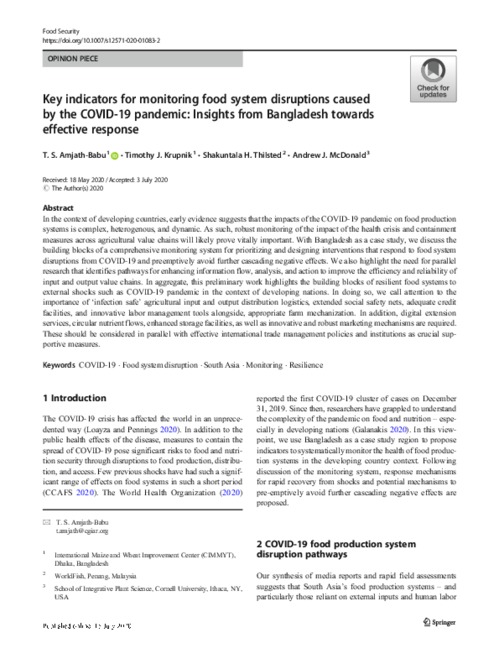Please use this identifier to cite or link to this item:
https://hdl.handle.net/20.500.12348/4237
Key indicators for monitoring food system disruptions caused by the COVID-19 pandemic: Insights from Bangladesh towards effective response
| dc.creator | Amjath-Babu, T. | en_US |
| dc.creator | Krupnik, T.J. | en_US |
| dc.creator | Thilsted, S.H. | en_US |
| dc.creator | McDonald, A.J. | en_US |
| dc.date.accessioned | 2020-07-20T07:33:04Z | |
| dc.date.available | 2020-07-20T07:33:04Z | |
| dc.date.issued | 2020 | |
| dc.identifier.citation | Food Security, online first 15 July. | en_US |
| dc.identifier.issn | 1876-4517 | en_US |
| dc.identifier.uri | https://hdl.handle.net/20.500.12348/4237 | |
| dc.description.abstract | In the context of developing countries, early evidence suggests that the impacts of the COVID-19 pandemic on food production systems is complex, heterogenous, and dynamic. As such, robust monitoring of the impact of the health crisis and containment measures across agricultural value chains will likely prove vitally important. With Bangladesh as a case study, we discuss the building blocks of a comprehensive monitoring system for prioritizing and designing interventions that respond to food system disruptions from COVID-19 and preemptively avoid further cascading negative effects. We also highlight the need for parallel research that identifies pathways for enhancing information flow, analysis, and action to improve the efficiency and reliability of input and output value chains. In aggregate, this preliminary work highlights the building blocks of resilient food systems to external shocks such as COVID-19 pandemic in the context of developing nations. In doing so, we call attention to the importance of ‘infection safe’ agricultural input and output distribution logistics, extended social safety nets, adequate credit facilities, and innovative labor management tools alongside, appropriate farm mechanization. In addition, digital extension services, circular nutrient flows, enhanced storage facilities, as well as innovative and robust marketing mechanisms are required. These should be considered in parallel with effective international trade management policies and institutions as crucial supportive measures. | en_US |
| dc.format | en_US | |
| dc.language | en | en_US |
| dc.publisher | Springer (part of Springer Nature) (Springer Open Choice Hybrid Journals) | en_US |
| dc.rights | CC-BY-NC-4.0 | en_US |
| dc.subject | no poverty | en_US |
| dc.subject | zero hunger | en_US |
| dc.subject | coronavirus disease | en_US |
| dc.subject | supply chain disruptions | en_US |
| dc.subject | Fish | en_US |
| dc.title | Key indicators for monitoring food system disruptions caused by the COVID-19 pandemic: Insights from Bangladesh towards effective response | en_US |
| dc.type | Journal Article | en_US |
| dcterms.bibliographicCitation | Amjath Babu, T. S. Krupnik, T. J. Thilsted, S. H. McDonald, A. J. (2020). Key indicators for monitoring food system disruptions caused by the COVID-19 pandemic: Insights from Bangladesh towards effective response. Food Security, online first 15 July. | |
| cg.contributor.crp | Fish | en_US |
| cg.contributor.funder | CGIAR System Office | en_US |
| cg.coverage.country | Bangladesh | en_US |
| cg.coverage.region | Southern Asia | en_US |
| cg.identifier.worldfish | 4757 | |
| cg.subject.agrovoc | food security | en_US |
| cg.subject.agrovoc | monitoring | en_US |
| cg.subject.agrovoc | nutrition | en_US |
| cg.subject.agrovoc | resilience | en_US |
| cg.subject.agrovoc | food systems | en_US |
| cg.contributor.affiliation | International Maize and Wheat Improvement Center | en_US |
| cg.contributor.affiliation | WorldFish | en_US |
| cg.contributor.affiliation | Cornell University | en_US |
| cg.identifier.status | Open access | en_US |
| cg.identifier.ISIindexed | ISI indexed | en_US |
| cg.contribution.worldfishauthor | Thilsted, S.H. | en_US |
| cg.description.theme | Value chains and nutrition | en_US |
| dc.identifier.doi | https://dx.doi.org/10.1007/s12571-020-01083-2 | en_US |
